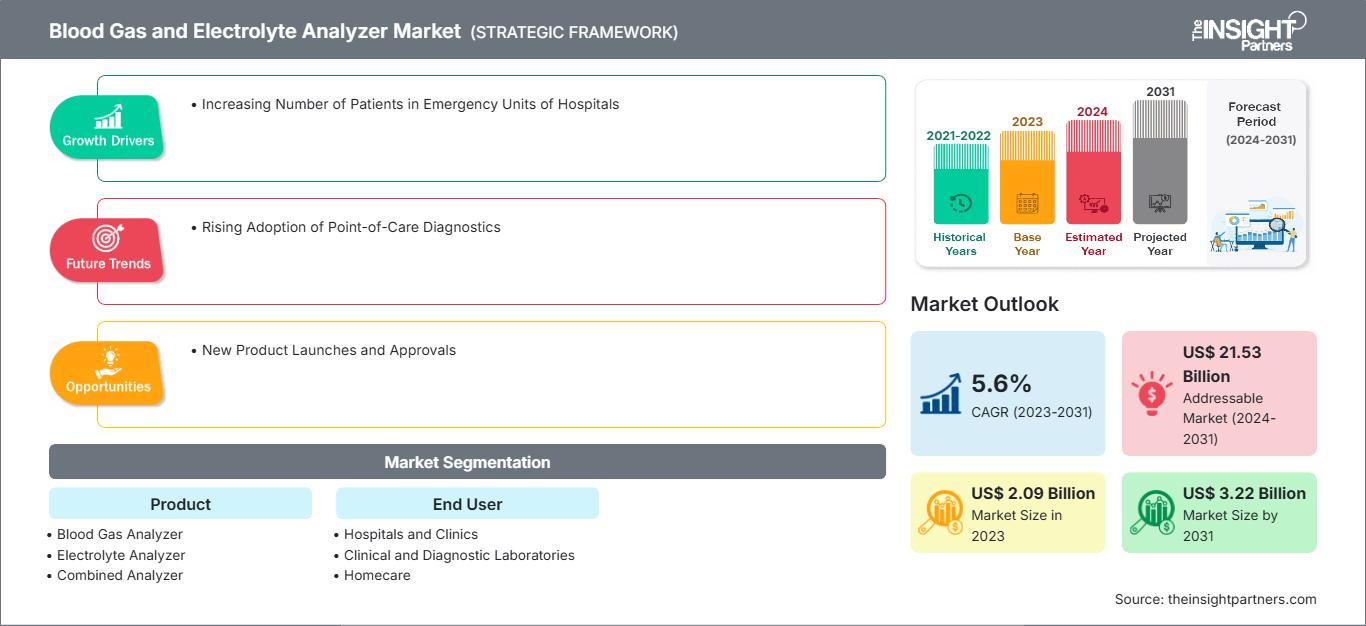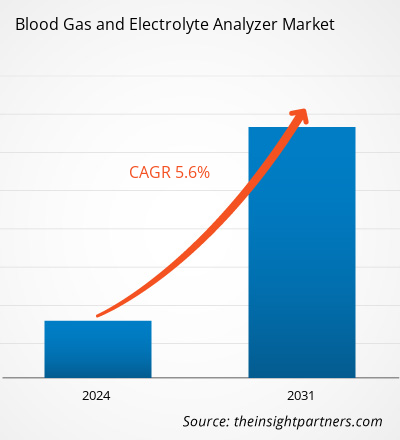Der Markt für Blutgas- und Elektrolytanalysatoren soll von 2,09 Milliarden US-Dollar im Jahr 2023 auf 3,22 Milliarden US-Dollar im Jahr 2031 anwachsen. Für den Zeitraum 2023–2031 wird ein durchschnittliches jährliches Wachstum (CAGR) von 5,6 % erwartet. Automatisierung und künstliche Intelligenz in der Blutgas- und Elektrolytanalysator-Branche bleiben voraussichtlich die wichtigsten Markttrends.
Marktanalyse für Blutgas- und Elektrolytanalysatoren
Einer der wichtigsten Wachstumstreiber für Blutgas- und Elektrolytanalysatoren ist die zunehmende Verbreitung chronischer Erkrankungen wie Atemwegserkrankungen, Nierenerkrankungen und Diabetes. Diese Erkrankungen erfordern häufig eine regelmäßige Überwachung des Elektrolythaushalts und der Blutgaswerte, um eine angemessene Behandlung sicherzustellen. Die steigende Zahl geriatrischer Patienten erhöht die Prävalenz dieser chronischen Erkrankungen, was die Nachfrage nach Blutgas- und Elektrolytanalysatoren zur Unterstützung der Patientenversorgung und Verbesserung der klinischen Ergebnisse steigert. Darüber hinaus treiben technologische Fortschritte bei diesen Analysegeräten, darunter schnellere Ergebnisse, die Integration in elektronische Patientenakten und eine verbesserte Genauigkeit, das Wachstum des Marktes für Blutgas- und Elektrolytanalysegeräte voran.
Marktübersicht für Blutgas- und Elektrolytanalysegeräte
Die Automatisierung in der Blutgas- und Elektrolytanalyse umfasst den Einsatz von Robotersystemen, Probenhandhabungsmechanismen und automatisierten Arbeitsabläufen, um Testprozesse zu optimieren, manuelle Eingriffe zu reduzieren und die Ergebnisbereitstellungszeiten zu verkürzen. Die Automatisierung verbessert die Laborproduktivität und minimiert das Risiko menschlicher Fehler, wodurch Gesundheitsdienstleister konsistente und zuverlässige Diagnoseergebnisse erhalten. Automatisierte Probenverarbeitung, intelligente Ergebnisinterpretation und prädiktive Analytik ermöglichen Gesundheitsdienstleistern umfassende Einblicke in den Stoffwechselstatus, den Elektrolythaushalt und das Säure-Basen-Gleichgewicht eines Patienten und fördern so fundierte klinische Entscheidungen und personalisierte Behandlungsstrategien. Darüber hinaus ermöglicht die Integration von Konnektivität und digitalen Gesundheitslösungen einen nahtlosen Datentransfer, Fernüberwachung und die Echtzeit-Zusammenarbeit zwischen Gesundheitsteams, wodurch eine effiziente Patientenversorgung und Behandlungsergebnisse optimiert werden.
Passen Sie diesen Bericht Ihren Anforderungen an
Sie erhalten kostenlos Anpassungen an jedem Bericht, einschließlich Teilen dieses Berichts oder einer Analyse auf Länderebene, eines Excel-Datenpakets sowie tolle Angebote und Rabatte für Start-ups und Universitäten.
Markt für Blutgas- und Elektrolytanalysatoren: Strategische Einblicke

-
Holen Sie sich die wichtigsten Markttrends aus diesem Bericht.Dieses KOSTENLOSE Beispiel umfasst Datenanalysen, die von Markttrends bis hin zu Schätzungen und Prognosen reichen.
Markttreiber und -chancen für Blutgas- und Elektrolytanalysatoren
Steigende Patientenzahlen in Notaufnahmen von Krankenhäusern begünstigen den Markt
Die steigende Zahl von Patienten, die in Notaufnahmen von Krankenhäusern behandelt werden, wirkt sich positiv auf die Nachfrage nach Blutgas- und Elektrolytanalysatoren aus. Laut der Weltgesundheitsorganisation (WHO) suchen jährlich rund 150 Millionen Patienten die Notaufnahmen von Krankenhäusern auf der ganzen Welt auf. In den USA werden laut den von der CDC im Jahr 2023 veröffentlichten Daten jährlich etwa 139,8 Millionen Besuche in der Notaufnahme verzeichnet. Darüber hinaus gab es zwischen 2011 und 2021 in Kalifornien einen Anstieg der Notaufnahmebesuche um 7,4 %. Da Notaufnahmen zunehmend unter Druck stehen, schnell und genau Untersuchungen bei schwer kranken Patienten durchzuführen, werden zeitnahe diagnostische Informationen zu Blutgaswerten, Elektrolytwerten und Säure-Basen-Gleichgewicht von größter Bedeutung. Blutgas- und Elektrolytanalysatoren liefern sofortige diagnostische Daten zur Beurteilung und Behandlung von Patienten mit Atemnot, Stoffwechselstörungen oder kritischem Zustand. Die Fähigkeit dieser Analysatoren, Echtzeit-Einblicke in den Sauerstoffsättigungsstatus, das Säure-Basen-Gleichgewicht und den Elektrolytspiegel eines Patienten zu liefern, ist entscheidend für die Steuerung von Wiederbelebungsmaßnahmen und die Optimierung klinischer Ergebnisse in Notfallsituationen. Da Krankenhäuser der Verbesserung der Notfallversorgung Priorität einräumen, um den Anforderungen einer wachsenden Patientenzahl gerecht zu werden, erlebt der Markt für Blutgas- und Elektrolytanalysatoren eine zunehmende Akzeptanz technologisch fortschrittlicher Lösungen, die auf die Notfall- und Intensivpflege zugeschnitten sind.
Neue Produkteinführungen und Zulassungen bieten Marktchancen
Die Entwicklung der Gesundheitsbranche hat zu einem Anstieg der Nachfrage nach Blutgas- und Elektrolytanalysatoren bei Gesundheitsdienstleistern weltweit geführt. Diese gestiegene Nachfrage trägt zur Entwicklung neuer Produkte, Produkteinführungen und Zulassungen auf globaler Ebene bei. Darüber hinaus sind wichtige Marktteilnehmer in Forschungs- und Entwicklungsaktivitäten involviert, um die Innovation und Entwicklung effizienter Produkte sicherzustellen. Im Folgenden sind einige der jüngsten Produkteinführungen und -entwicklungen aufgeführt:
- Im Juli 2023 brachte Siemens Healthineers den neuen Atellica CI-Analysator für klinische Chemie und Immunoassay-Tests auf den Markt. Die US-amerikanische Food and Drug Administration (FDA) hatte den Analysator vor seiner Markteinführung zugelassen. Er ist derzeit an mehreren internationalen Standorten erhältlich.
- Im Juli 2022 kündigte EDAN Instruments, Inc. auf der 74. Jahrestagung und Clinical Laboratory Exposition der American Association for Clinical Chemistry (2022 AACC) die Einführung des ersten Point-of-Care (POC)-Fluoreszenz-basierten CO-OX-Blutgas- und Chemieanalysesystems i20 an. Das System verfügt über mehr als 45 Parameter, von Blutgasen über Elektrolyte bis hin zur CO-Oximetrie.
Daher dürfte eine Zunahme von Produktentwicklungen, Markteinführungen und strategischen Kooperationen zwischen Marktteilnehmern in den kommenden Jahren reichlich Chancen für den Markt für Blutgas- und Elektrolytanalysatoren schaffen.
Segmentierungsanalyse des Marktberichts für Blutgas- und Elektrolytanalysatoren
Schlüsselsegmente, die zur Ableitung der Marktanalyse für Blutgas- und Elektrolytanalysatoren beigetragen haben, sind Produkt und Endbenutzer.
- Basierend auf dem Produkt ist der Markt für Blutgas- und Elektrolytanalysatoren in Blutgasanalysatoren, Elektrolytanalysatoren, kombinierte Analysatoren und andere unterteilt. Das Segment der kombinierten Analysatoren hatte im Jahr 2023 den größten Marktanteil.
- Nach Endbenutzer ist der Markt in Krankenhäuser und Kliniken, klinische und diagnostische Labore, Einrichtungen der häuslichen Pflege und andere segmentiert. Das Segment der klinischen und diagnostischen Labore hielt 2023 den größten Marktanteil.
Marktanteilsanalyse für Blutgas- und Elektrolytanalysatoren nach Geografie
Der geografische Umfang des Marktberichts für Blutgas- und Elektrolytanalysatoren ist hauptsächlich in fünf Regionen unterteilt: Nordamerika, Asien-Pazifik, Europa, Naher Osten und Afrika sowie Süd- und Mittelamerika.
Nordamerika dominierte 2023 den Markt für Blutgas- und Elektrolytanalysatoren. Das regionale Marktwachstum wird durch das zunehmende öffentliche Bewusstsein für Herz-Kreislauf-Erkrankungen sowie die zunehmende Forschung und Zusammenarbeit zur Erforschung innovativer therapeutischer Anwendungen auf dem Markt vorangetrieben. Der Markt für Blutgas- und Elektrolytanalysatoren in Nordamerika wird voraussichtlich durch die Präsenz verschiedener wichtiger Akteure auf dem Markt florieren. Darüber hinaus fördert der Einsatz medizinischer Geräte im Gesundheitswesen zur Qualitätsverbesserung und Kostensenkung das Marktwachstum in der Region. Der Asien-Pazifik-Raum wird im Prognosezeitraum voraussichtlich die höchste durchschnittliche jährliche Wachstumsrate verzeichnen.
Blutgas- und Elektrolytanalysator
Regionale Einblicke in den Markt für Blutgas- und ElektrolytanalysatorenDie Analysten von The Insight Partners haben die regionalen Trends und Faktoren, die den Markt für Blutgas- und Elektrolytanalysegeräte im Prognosezeitraum beeinflussen, ausführlich erläutert. In diesem Abschnitt werden auch die Marktsegmente und die geografische Lage in Nordamerika, Europa, dem asiatisch-pazifischen Raum, dem Nahen Osten und Afrika sowie Süd- und Mittelamerika erörtert.
Umfang des Marktberichts zu Blutgas- und Elektrolytanalysatoren
| Berichtsattribut | Einzelheiten |
|---|---|
| Marktgröße in 2023 | US$ 2.09 Billion |
| Marktgröße nach 2031 | US$ 3.22 Billion |
| Globale CAGR (2023 - 2031) | 5.6% |
| Historische Daten | 2021-2022 |
| Prognosezeitraum | 2024-2031 |
| Abgedeckte Segmente |
By Produkt
|
| Abgedeckte Regionen und Länder |
Nordamerika
|
| Marktführer und wichtige Unternehmensprofile |
|
Marktdichte von Blutgas- und Elektrolytanalysegeräten: Auswirkungen auf die Geschäftsdynamik verstehen
Der Markt für Blutgas- und Elektrolytanalysegeräte wächst rasant. Die steigende Nachfrage der Endverbraucher ist auf Faktoren wie veränderte Verbraucherpräferenzen, technologische Fortschritte und ein stärkeres Bewusstsein für die Produktvorteile zurückzuführen. Mit der steigenden Nachfrage erweitern Unternehmen ihr Angebot, entwickeln Innovationen, um den Bedürfnissen der Verbraucher gerecht zu werden, und nutzen neue Trends, was das Marktwachstum weiter ankurbelt.

- Holen Sie sich die Markt für Blutgas- und Elektrolytanalysatoren Übersicht der wichtigsten Akteure
Marktneuigkeiten und aktuelle Entwicklungen im Bereich Blutgas- und Elektrolytanalysatoren
Der Markt für Blutgas- und Elektrolytanalysatoren wird durch die Erhebung qualitativer und quantitativer Daten aus Primär- und Sekundärforschung bewertet, die wichtige Unternehmensveröffentlichungen, Verbandsdaten und Datenbanken umfasst. Einige der Entwicklungen auf dem Markt sind nachfolgend aufgeführt:
- Sysmex America, Inc. erhielt die FDA-Zulassung für den Blutbankmodus des automatischen Hämatologieanalysators XN-10, einschließlich der Restzählung weißer Blutkörperchen. Das Unternehmen gab bekannt, dass der neue Analysator die Effizienz, Konsistenz und Genauigkeit von Blutverarbeitungszentren steigern könne, indem er die Restzählung weißer Blutkörperchen, roter Blutkörperchen (RBC) und Thrombozytenkomponenten (PLT) in einer einzigen Probenentnahme unterstützt. (Quelle: Sysmex America, Unternehmenswebsite, Juni 2022)
- Sensa Core Medical Instrumentation hat die Blutgasanalysatoren ST-200 CC – Ultra Smart – für den Einsatz in Kliniken, Krankenhäusern und Diagnosezentren auf den Markt gebracht. Das hochmoderne Blutgasmodell des Unternehmens ist der Blutgasanalysator ST-200 CC Ultra Smart ABGEM. Es handelt sich um ein vollautomatisches, mikroprozessorgesteuertes Elektrolytsystem, das arterielle Blutgasanalysen und Elektrolytmessungen mittels Stromdirektmessung mit Ionen-selektiver Elektrode (ISE), Impedanz (Hct) und Amperometrie (pO2) durchführt. (Quelle: Sensa Core Medical Instrumentation, Unternehmenswebsite, September 2021)
Marktbericht zu Blutgas- und Elektrolytanalysatoren: Umfang und Ergebnisse
Der „Marktbericht zu Blutgas- und Elektrolytanalysatoren: Größe und Prognose (2021–2031)“ Der Bericht bietet eine detaillierte Analyse des Marktes und deckt die folgenden Bereiche ab:
- Marktgröße und Prognose für Blutgas- und Elektrolytanalysatoren auf globaler, regionaler und Länderebene für alle abgedeckten wichtigen Marktsegmente
- Markttrends und Marktdynamiken wie Treiber, Einschränkungen und wichtige Chancen für Blutgas- und Elektrolytanalysatoren
- Detaillierte PEST/Porters Five Forces- und SWOT-Analyse
- Marktanalyse für Blutgas- und Elektrolytanalysatoren mit wichtigen Markttrends, globalen und regionalen Rahmenbedingungen, wichtigen Akteuren, Vorschriften und aktuellen Marktentwicklungen
- Branchenlandschaft und Wettbewerbsanalyse mit Marktkonzentration, Heatmap-Analyse, prominenten Akteuren und aktuellen Entwicklungen für den Markt für Blutgas- und Elektrolytanalysatoren
- Detaillierte Unternehmensprofile
- Historische Analyse (2 Jahre), Basisjahr, Prognose (7 Jahre) mit CAGR
- PEST- und SWOT-Analyse
- Marktgröße Wert/Volumen – Global, Regional, Land
- Branchen- und Wettbewerbslandschaft
- Excel-Datensatz
Aktuelle Berichte
Verwandte Berichte
Erfahrungsberichte
Grund zum Kauf
- Fundierte Entscheidungsfindung
- Marktdynamik verstehen
- Wettbewerbsanalyse
- Kundeneinblicke
- Marktprognosen
- Risikominimierung
- Strategische Planung
- Investitionsbegründung
- Identifizierung neuer Märkte
- Verbesserung von Marketingstrategien
- Steigerung der Betriebseffizienz
- Anpassung an regulatorische Trends






















 Kostenlose Probe anfordern für - Markt für Blutgas- und Elektrolytanalysatoren
Kostenlose Probe anfordern für - Markt für Blutgas- und Elektrolytanalysatoren